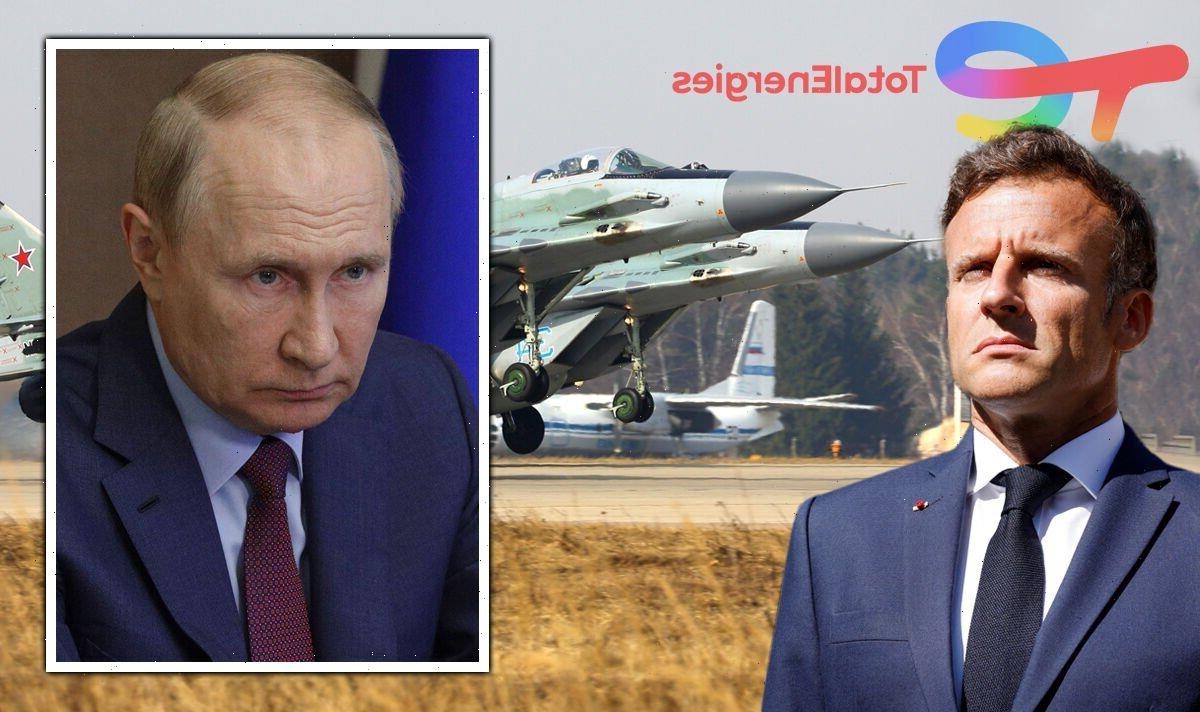Russia ‘using gas weapon’ to ‘break’ NATO says Mayall
We use your sign-up to provide content in ways you’ve consented to and to improve our understanding of you. This may include adverts from us and 3rd parties based on our understanding. You can unsubscribe at any time. More info
TotalEnergies, which part owns the Termokarstovoye field in Russia’s far north along with Russian gas firm Novatek, produces around 600,000 tonnes of gas condensate (similar to crude oil) each month. According to the NGO Global Witness, this then gets shipped to Gapzrom’s Neft refinery in Omsk, where the condensate gets refined into products such as petrol, or jet fuel.
And hundreds of shipments of jet fuel produced at Omsk have been sent to Russian Air Force bases near Ukraine, according to reports.
With the help of Global Witness and information from financial database Refinitiv, French outlet Le Monde traced the supply chain from Termokarstovoye to the two military airbases.
Called Morozovskaya and Malchevo, each houses a squadron of multirole combat aircrafts.
Shipments were reportedly recorded both in the build-up to Russia’s February 24 invasion and have continued amid the brutal war.
Terneftegaz supplied the gas condensate for the Russian warplanes, which Totalenergies holds a 49 percent stake in.
The French firms still holds this share despite other energy giants pulling out of Russia amid the war in order to sanction Putin for his brutal invasion.
Ukraine has erupted in fury at the news, calling it a “disgrace to France”.
Ukraine’s Minister of Foreign Affairs Dmytro Kuleba said: “We are grateful to Emmanuel Macron and the French people for supporting Ukraine. Against this background, it is a disgrace to France when French companies assist the murder of Ukrainians and the ruining of our cities. TotalEnergies, pull out of Russia!”
But TotalEnergies has claimed it had no knowledge of where the gas condensate was going, arguing it does not operate infrastructure which supplies the Russian military.
But it did confirm that all the gas condensate produced by Terneftegaz was supplied to Novatek, which the French firm also holds a 19.4 percent stake in.
TotalEnergies: “TotalEnergies has no information on, or control over, Novatek’s independent sales to the Russian market.”
But while it claims not to have any control over where the gas condensate goes, it did not deny that its supplies ultimately get used by Russian war planes.
Louis Wilson, an advisor at Global Witness, said: “Total has not denied that gas condensate from its joint venture is ultimately refined into jet fuel for the Russian Air Force.
“Ignorance is no excuse.”
DON’T MISS
Energy bills LIFELINE for millions as UK can freeze prices for YEARS [REVEAL]
POLL: Should next Prime Minister approve fracking to cut energy bills? [POLL]
British Gas hands energy lifeline to millions of Britons to SLASH bill [REPORT]
Global Witness added that enough jet fuel to fill the internal tanks of a Su-34 bomber thousands of times over were shipped to the Russian bases between February and July.
While France’s energy giant remains in Russia, other major companies began to pull out months ago.
Back in March, Shell pulled out of a joint venture called Sakhalin-2, a huge liquified natural gas project which the company had a 27.5 percent stake in.
BP also said it would abandon its 20 percent stake in Russian oil giant Rosneft, which would mean an £18billion loss for Russia, according to some estimates.
Shell’s chief executive officer, Ben van Beurden, said back in March: “We are shocked by the loss of life in Ukraine, which we deplore, resulting from a senseless act of military aggression which threatens European security.
“Our decision to exit is one we take with conviction. We cannot — and we will not — stand by. Our immediate focus is the safety of our people in Ukraine and supporting our people in Russia.”
Meanwhile, TotalEnergies still holds a stake in a number of Russian energy projects worth billions, including the Yamal LNG and Arctic LNG 2 projects.
Source: Read Full Article





